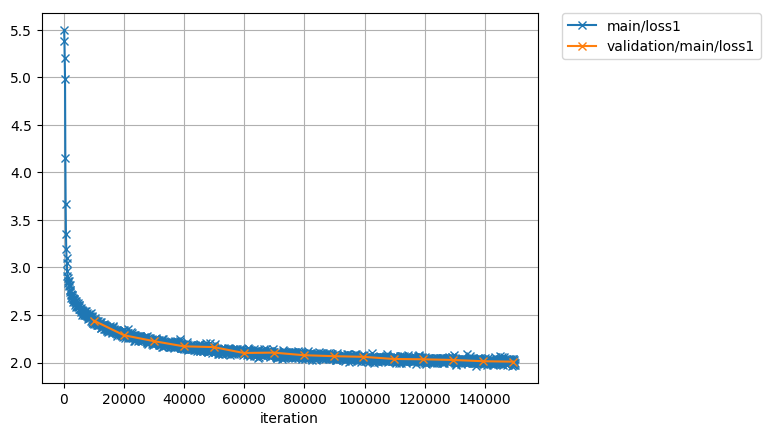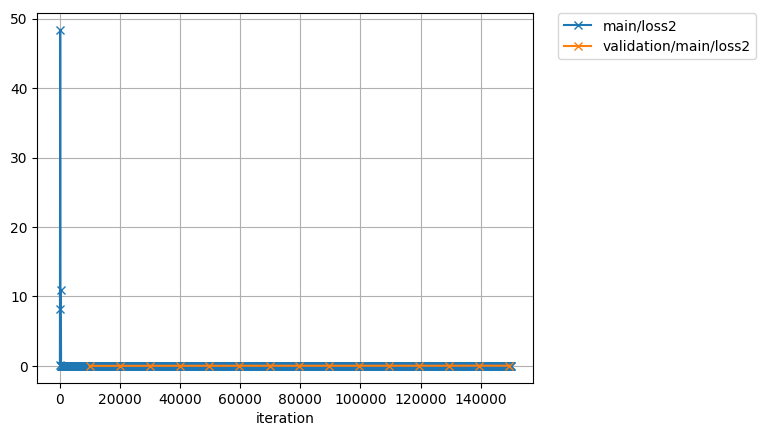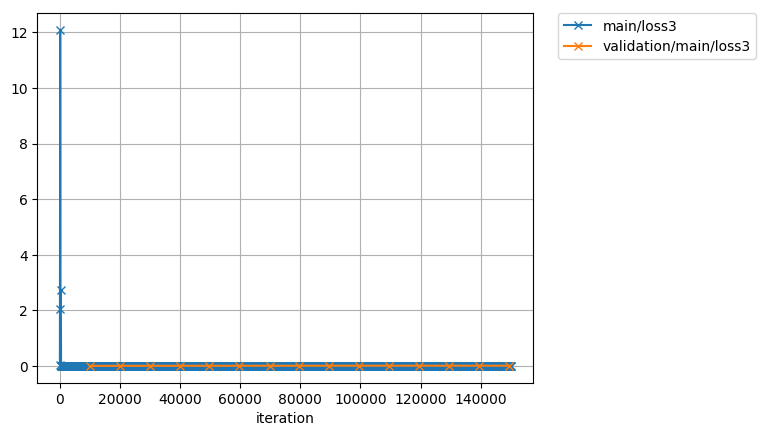A Chainer implementation of VQ-VAE( https://arxiv.org/abs/1711.00937 ).
Trained about 63 hours with one 1080Ti (150000 iterations) on VCTK-Corpus. You can download pretrained model from here.
Losses:
Audios:
I trained and generated with
- python(3.5.2)
- chainer(4.0.0b3)
- librosa(0.5.1)
And now you can try it on Google Colaboratory. You don't need install chainer/librosa in your local or buy GPUs. Check this.
You can download VCTK-Corpus(en) from here. And you can download CMU-ARCTIC(en)/voice-statistics-corpus(ja) very easily via my repository.
- batchsize
- Batch size.
- lr
- Learning rate.
- ema_mu
- Rate of exponential moving average. If this is greater than 1 doesn't apply.
- trigger
- How many times you update the model. You can set this parameter like as (
<int>, 'iteration') or (<int>, 'epoch')
- How many times you update the model. You can set this parameter like as (
- evaluate_interval
- The interval that you evaluate validation dataset. You can set this parameter like as trigger.
- snapshot_interval
- The interval that you save snapshot. You can set this parameter like as trigger.
- report_interval
- The interval that you write log of loss. You can set this parameter like as trigger.
- root
- The root directory of training dataset.
- dataset
- The architecture of the directory of training dataset. Now this parameter supports
VCTK,ARCTICand 'vs'.
- The architecture of the directory of training dataset. Now this parameter supports
- split_seed
- A seed for splitting dataset into train and validation.
- sr
- Sampling rate. If it's different from input file, be resampled by librosa.
- res_type
- The resampling algorithm used in librosa.
- top_db
- The threshold db for triming silence.
- input_dim
- The input channels of wave. If it is
1, mu-law is not applied. Else mu-law is applied.
- The input channels of wave. If it is
- quantize
- The number for quantize.
- length
- How many samples used for training.
- use_logistic
- Use mixture of logistics or not.
- d
- The parameter
din the paper.
- The parameter
- k
- The parameter
kin the paper.
- The parameter
- n_loop
- If you want to make network like dilations [1, 2, 4, 1, 2, 4] set
n_loopas2.
- If you want to make network like dilations [1, 2, 4, 1, 2, 4] set
- n_layer
- If you want to make network like dilations [1, 2, 4, 1, 2, 4] set
n_layeras3.
- If you want to make network like dilations [1, 2, 4, 1, 2, 4] set
- filter_size
- The filter size of each dilated convolution.
- residual_channels
- The number of input/output channels of residual blocks.
- dilated_channels
- The number of output channels of causal dilated convolution layers. This is splited into tanh and sigmoid so the number of hidden units is half of this number.
- skip_channels
- The number of channels of skip connections and last projection layer.
- n_mixture
- The number of logistic distribution. It is used only
use_logisticisTrue.
- The number of logistic distribution. It is used only
- log_scale_min
- The number for stability. It is used only
use_logisticisTrue.
- The number for stability. It is used only
- global_condition_dim
- The dimension of speaker embeded-vector.
- local_condition_dim
- The dimension of local contioning vectors.
- dropout_zero_rate
- The rate of
0in dropout. If0doesn't apply dropout.
- The rate of
- beta
- The parameter
betain the paper.
- The parameter
- use_ema
- If
Trueuse the value of exponential moving average.
- If
- apply_dropout
- If
Trueapply dropout.
- If
(without GPU)
python train.py
(with GPU #n)
python train.py -g n
If you want to use multi GPUs, you can add IDs like below.
python train.py -g 0 1 2
You can resume snapshot and restart training like below.
python train.py -r snapshot_iter_100000
Other arguments -f and -p are parameters for multiprocess in preprocessing. -f means the number of prefetch and -p means the number of processes.
python generate.py -i <input file> -o <output file> -m <trained model> -s <speaker>
If you don't set -o, default file name result.wav is used. If you don't set -s, the speaker is same as input file that got from filepath.
- upload generated sample
- using GPU fot generating
- descritized mixture of logistics
- Parallel WaveNet


